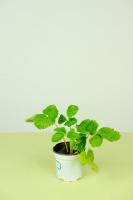Introduction
Growing tomato plants in pots is a great way to enjoy fresh, juicy tomatoes even on a small balcony or patio. However, providing sufficient nutrients in the limited amount of soil can be a challenge. Fertilizing is an important aspect of tomato plant care, but how often should you fertilize potted tomato plants? Let's dive in and find out!
The Basics of Fertilizing Potted Tomato Plants
Tomatoes are heavy feeders and require plenty of nutrients for healthy growth and fruit production. Potted tomato plants have limited access to soil, which means fertilizing is essential for their survival. The three main nutrients that tomato plants need are nitrogen, phosphorus, and potassium. A good tomato fertilizer should contain all three of these nutrients in balanced amounts.
Early Growth Stage
When the tomato plant is still young and just starting to grow, it doesn't need a lot of fertilizer. In fact, fertilizing too early can lead to excess nitrogen, which can stunt growth and reduce fruit production. Wait until the plant has developed its first true leaves, and then apply a balanced fertilizer at half strength. Repeat this process every two weeks until the plant is well-established.
Mid-Season Growth Stage
As the tomato plant begins to mature and develop its fruit, it requires more nutrients to support growth and ripening. Increase the frequency of fertilization to once a week, still using a balanced fertilizer at full strength. This will provide the plant with the necessary nutrients to produce healthy and abundant fruit.
Late-Season Growth Stage
Towards the end of the growing season, the tomato plant will begin to slow down and focus on ripening its remaining fruit. At this stage, it's important to reduce the frequency of fertilization to once every two weeks. Using too much fertilizer late in the season can cause the plant to put too much energy into foliage growth instead of fruit production.
Other Tips and Considerations
Aside from knowing how often to fertilize, there are other things to keep in mind when caring for potted tomato plants. One important consideration is the type of soil used in the container. A high-quality potting mix that is rich in organic matter and nutrients is ideal for tomato plants.
It's also important not to overwater the tomato plant, as this can flush out nutrients and make it more difficult for the roots to absorb them. Allow the top inch of soil to dry out before watering the plant deeply, and be sure to provide good drainage to prevent waterlogging.
Finally, consider using organic fertilizer options, such as compost or worm castings, instead of synthetic fertilizers. Organic fertilizers provide a slow-release of nutrients and help to improve the overall health of the soil.
Conclusion
Fertilizing potted tomato plants is crucial for their survival and health. Knowing how often to fertilize is key to providing the plant with the right amount of nutrients at the right time. Remember to adjust the frequency of fertilization based on the growth stage of the plant, and take other factors like soil quality and watering into consideration. With proper care, your potted tomato plant can produce abundant and delicious fruit all season long!

 how many times do yo...
how many times do yo... how many planted tre...
how many planted tre... how many pine trees ...
how many pine trees ... how many pecan trees...
how many pecan trees... how many plants comp...
how many plants comp... how many plants can ...
how many plants can ... how many plants and ...
how many plants and ... how many pepper plan...
how many pepper plan...































